(3) Emergency Assistance to Address the Rapid Spread of COVID-19 in Asia
Since April 2021, there has been a rapid spread of COVID-19 in Asian countries such as India, Indonesia, Thailand, and Laos, causing a medical crisis and economic and social disruption. In light of the strategic importance of these countries and in response to requests for support from each country, Japan implemented Emergency Grant Aid totaling approximately ¥4.5 billion and provided oxygen concentrators, ventilators, and other equipment through UNOPS, in addition to providing oxygen concentrators to India as emergency relief goods (see “Japanese Personnel at International Organizations Playing Active Roles on the Front Lines across the World amid the COVID-19 Pandemic” for the activities of Japanese personnel at UNOPS).
In addition, it was decided to provide approximately 620,000 items of seven different types of good, such as isolation gowns, safety goggles, and examination gloves to Bangladesh, Brunei, Cambodia, Laos, and Viet Nam from the stockpile of the Asia-Europe Foundation (ASEF) Note 8 with contributions from Japan, and the items have been delivered since May 2021.
Japanese NGOs also provided assistance through ODA. For example, in May 2021, the Japan Platform (JPF) Note 9 launched “Emergency Response to Delta Variant of COVID-19” to assist India and Nepal, where outbreaks of COVID-19 have been spreading rapidly since April 2021. Through this program, JPF provided emergency humanitarian assistance totaling ¥78 million for four projects in two countries. It distributed hygiene supplies such as masks, gloves, and disinfectants, and provided medical equipment such as oxygen concentrators and blood pressure monitors to medical institutions and residents in the target areas. In addition, JPF implemented awareness-raising activities for residents on infection prevention.
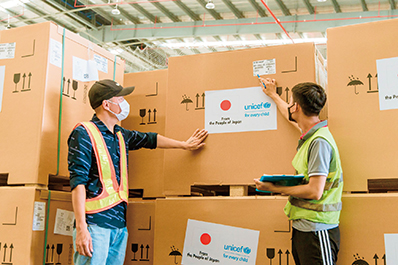
Equipment for the “Last One Mile Support” delivered to Viet Nam (Photo: UNICEF)
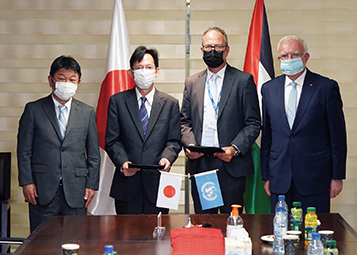
During his visit to Palestine, then Foreign Minister Motegi attended the signing ceremony for the grant aid to implement the Food Aid Programme to Palestinian refugees (in cooperation with the United Nations Relief and Works Agency for Palestine Refugees in the Near East (UNRWA)) along with Dr. Riad Malki, Minister of Foreign Affairs and Expatriates of Palestine (far right) (August 2021)
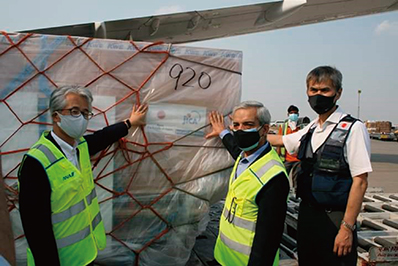
Oxygen concentrators as emergency relief goods from Japan arriving at an airport in India (May 2021) (Photo: JICA)
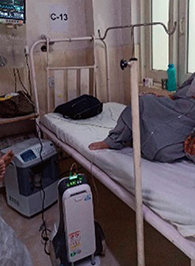
An oxygen concentrator delivered from Japan being used in a hospital in India (May 2021) (Photo: The Government of India)
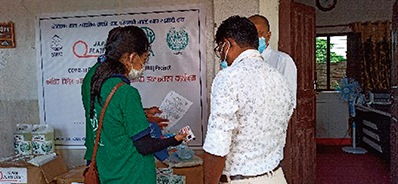
Explaining the medical equipment provided to a health center in Nepal (Photo: ADRA Japan)
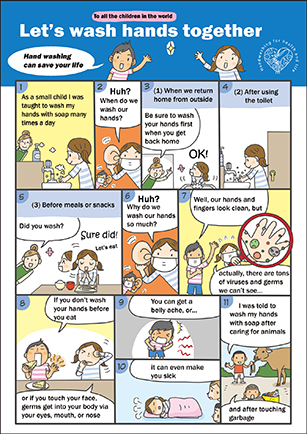
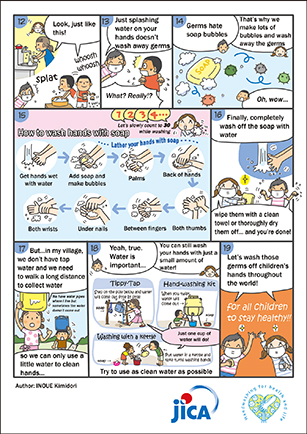
As part of the “Handwashing for Health and Life Campaign,” JICA has produced and distributed free of charge a “Correct Handwashing Cartoon” (created by INOUE Kimidori) in Japanese and English. As of the end of December 2021, it has been translated into 34 languages. (Provision of reference: JICA)
Special Contribution Japan’s Development Cooperation in the Future
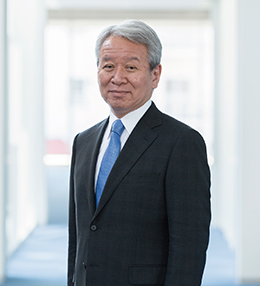
(Photo: KAWAMOTO Seiya)
Japan’s future development cooperation must respond to a number of long-term challenges. Looking at the international community as a whole, Japan’s development cooperation must contribute to the direction set by the Sustainable Development Goals (SDGs) adopted in 2015 and the Paris Agreement on climate change formulated in the same year. It must also respond to the challenges thrust upon us by COVID-19 from which the world has been suffering since 2020. From the viewpoint of Japanese diplomacy, our development cooperation is expected to play a major role for the “Free and Open Indo-Pacific (FOIP)” vision.
Whether the SDGs, climate change countermeasures, COVID-19 response and the FOIP while they are different initiatives, all of them are in fact very deeply interconnected. Unfortunately, COVID-19 is making it more difficult to achieve many of the SDGs globally. It has increased the world’s population living in extreme poverty, which had been declining for decades. In the future, once the world has overcome COVID-19 we must reinforce initiatives to eradicate the extreme poverty in most of developing countries. Japan’s development cooperation, which places importance on “human security,” should lead such initiatives in the international community.
With regard to the issue of climate change, in 2021, the 26th Session of the Conference of the Parties to the United Nations Framework Convention on Climate Change (COP26) reaffirmed the goal of limiting the increase in the global average temperature to below 1.5°C above pre-industrial levels. Given that implementing climate change countermeasures is a new economic paradigm, Japan should promote creative climate change countermeasures in development cooperation that generate synergies with private investment. Disaster risk reduction is not only a major challenge for Japan itself, but also a major field in which Japan can contribute to the world.
Even in the post-COVID-19 world, the Indo-Pacific region will have the most dynamic potential for development. The great surge of growth that began in East Asia in the second half of the 20th century reaches beyond two oceans to sub-Saharan Africa. However, in the Indo-Pacific region, there are countries with extreme poverty, as well as vulnerable and unstable political societies. Japan needs to make efforts to address the challenges faced by the least developed countries and to support them to achieve the SDGs, while opening up future prospects by promoting human resources and infrastructure development. The great mission of Japanese diplomacy and development cooperation should be to “build back better” the post-COVID-19 Indo-Pacific region while maintaining a free and open order.
Japan has pursued “visible development cooperation” whereby it has dispatched Japan Overseas Cooperation Volunteers (JOCVs) and JICA experts in various fields throughout the world and contributed to human resources development through training programs in both Japan and abroad. In the post-COVID-19 world, I hope to see once again that many Japanese play an active role and shine across various parts of the world
TANAKA Akihiko, President, National Graduate Institute for Policy Studies (GRIPS)
Glossary
- COVAX Facility (COVID-19 Vaccine Global Access Facility)
- The COVAX Facility is a comprehensive mechanism for resource mobilization and supply coordination led by Gavi to secure equitable access to vaccines. COVAX enables supply of COVID-19 vaccines swiftly at an affordable price, leveraging economies of scale through guaranteeing purchase and market demand for vaccines. The COVAX Facility has provided vaccines to 144 countries and regions as of December 2021
- Gavi, the Vaccine Alliance
- Gavi, the Vaccine Alliance, is a public-private partnership that was established in 2000 with the aim of saving children’s lives and protecting people’s health by improving immunization coverage in developing countries. Governments of donor countries and developing countries, relevant international organizations, the pharmaceutical industry, private foundations, and civil society participate in this partnership. Since its establishment, it is said to have vaccinated 888 million children and saved over 15 million lives. Japan has provided a cumulative total of approximately $390 million in aid by 2021 since the initial contribution in 2011.
- Advance Market Commitment (AMC) of the COVID-19 Vaccine Global Access Facility (COVAX Facility)
- A framework at the COVAX Facility to promote the supply of COVID-19 vaccines in developing countries and regions. It is an international framework where donors contribute their funds, whereby COVAX/AMC controls the cost burden of developing countries and regions by partially covering vaccine purchase costs. Under this framework, Gavi provides an advance guarantee of the purchase of a certain amount of vaccines to vaccine manufacturers so that the market for the developed and manufactured vaccines is assured. This encourages the expansion of manufacturing capacities in order to put in place a vaccine manufacturing system at scale that meets the demand.
- Debt Service Suspension Initiative (DSSI)
- A framework for temporarily suspending debt payments for low-income countries facing a liquidity crisis due to COVID-19’s impact. The Paris Club, a meeting of major creditor countries and the G20, agreed in April 2020 to temporarily suspend payment of debts that would be due in the period from May 2020 to the end of December 2020, and subsequently extended the suspension period twice (agreed in October 2020 on an extension to June 2021, and in April 2021 on an extension to the end of December 2021). As of December 21, 2021, 45 developing countries had signed a memorandum of understanding with the Paris Club.
- Common Framework for Debt Treatments beyond the DSSI
- A framework for providing debt relief to low-income countries on a case-by-case basis agreed to by the G20 and Paris Club in November 2020. This is the first agreement to jointly determine the terms of debt measures in a manner that involves non-Paris Club countries such as China.
- Note 8: ASEF was founded in Singapore in 1997 as a sole permanent body of the Asia-Europe Meeting (ASEM), aimed at conducting activities in the socio-cultural area, one of the pillars of ASEM. It conducts activities to promote broad mutual understanding and strengthen connectivity between Asia and Europe.
- Note 9: See the glossary.
